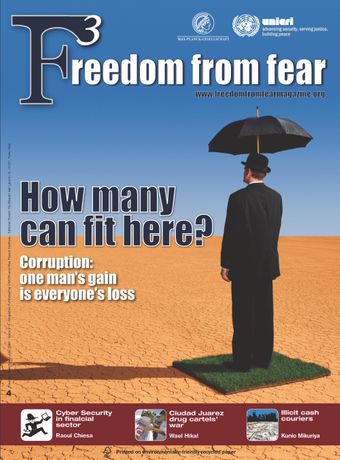-
Corruption and corruption control: An introduction
- Source: Freedom from Fear, Volume 2009, Issue 4, Jul 2009, p. 2 - 3
-
- 11 Jul 2009
Abstract
Corruption and control of corruption have become a focal concern in developed and developing countries. European countries - where corruption for a long time had been thought to present a plague strictly confined to underdeveloped countries - now are recognizing eminent dangers of corruption and an urgent need to control corrupt practices in the political, administrative and economic system. The Council of Europe has declared corruption a key political issue in Europe and stresses the links between corruption on the one hand and organized and serious economic crime on the other hand. However, one can say that also governments in European countries and elsewhere have (re)discovered the enormous moral, emotional and symbolic value of declaring wars against corruption. This becomes evident when for instance in the LIMA declaration corruption is depicted as a cancer, as something which has to be eradicated completely and as a disease like social phenomenon which threatens the social fabric at large. Other voices declare corruption to represent an attack on the “heart of the state”. In particular the view that corruption is closely linked to organized and transnational crime and that control of corruption should also be part of a medicine against organized crime at large has fueled attempts to strengthen repressive and preventive policies against corruption. This has led also to see corruption not only as a threat to proper public administration and law enforcement and effective anti-corruption policies as a precondition of good governance, but as a strategic instrument used by organized crime groups to establish parallel worlds and a system of impunity. Increased media attention certainly is contributing to the growing awareness of problems of corruption and corruption control. The European Union has expressed interest in corruption control in particular with a view of protecting the system of European subsidies and the European Union’s budget. However, corruption evidently exists without organized crime and without supranational opportunities to deviate funds from supranational budgets. While control of corruption and bribery for most of the 20th Century was conceived as a task entrusted to national law enforcement and national criminal justice systems, in the last two decades of the 20th Century – following the discourse on transnational organized crime – corruption control became an issue with an European, international and transnational dimension. Transnational corruption was raised as a problem in particular through the US Foreign Corrupt Practices Act 1977 which – after an extended multilateral discourse – initiated drafting and enactment of similar legislation in industrialized countries.



